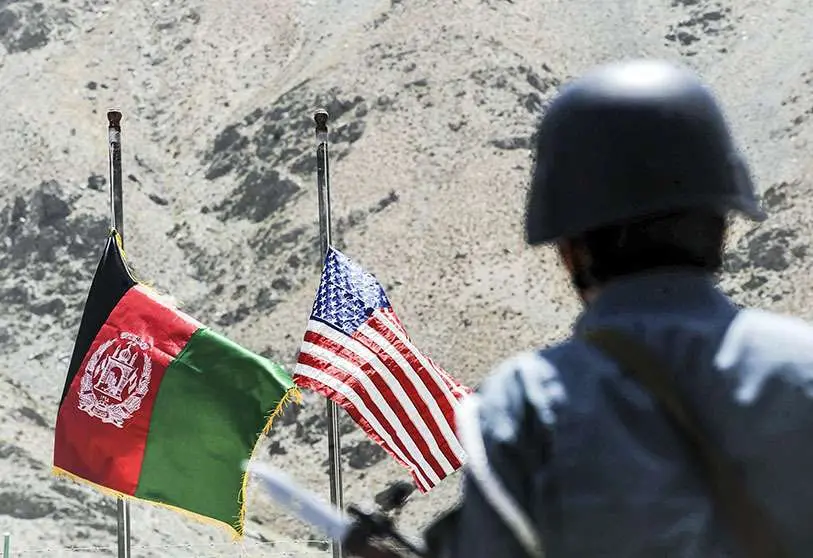The third empire to fall in the eternal war in Afghanistan

No one has succeeded in subduing the land formerly known as Khorasan and now Afghanistan since Alexander the Great in 329 B.C. It is a territory so indomitable that not even the British Empire managed to subdue it in all its splendour (1839-1842). Nor did the Soviets, who invaded the country in 1979, waged ten years of war and were subsequently defeated and left the country as a prelude to the collapse of the USSR and the fall of communism. Now, twenty years after unleashing Operation Enduring Freedom, the United States and its NATO allies are preparing to end their presence in the world's second most dangerous country after Syria, according to the Global Peace Index.
This vast and untamed territory is living in what Dexter Filkins called an " eternal war", a situation to which it will surely return as soon as the last of the 10,000 international troops leave, probably before September 11, the 20th anniversary of the attack on the Twin Towers in New York, which was President George W. Bush's pretext for bombing Afghanistan at the time. Osama Bin Laden, leader of Al Qaeda, was there under the protection of the Taliban regime, the students of Islamic theology whom the United States had financed and armed so that, from their bases in Pakistan, they would relentlessly harass the Soviet army.
The operation to oust the Taliban from power was justified by the extremely rigorous interpretation of Islam and, above all, the humiliating treatment of women, who were subjected to a regime of real terror and the permanent imprisonment of the burqa, in addition to the corresponding vengeance. The Taliban withdrew around the main Pashtun stronghold, Kunduz, and never gave up their main objective: establishing a draconian Islamic regime by subjugating the other three ethnic groups that inhabit Afghanistan: Tajiks, Uzbeks and Hazaras, the latter practising Shi'ism.
When President Joe Biden announced the end of the US military presence in Afghanistan, he more or less explicitly admitted the failure to achieve the supposedly main objective of building a viable, democratic state. He also alluded to the immense amount of money that is virtually going down the drain in maintaining this dead-end presence. The war, in fact, is the longest war waged by the American superpower, in which - in the time of President Barack H. Obama - more than 100,000 troops were being maintained simultaneously. These twenty years of war have cost American taxpayers a trillion (1,000,000,000,000,000,000) dollars, 2,300 dead and 20,000 wounded. It will also have cost Spain no less than 3 billion euros and 102 dead, including two nationalised translators.
Former British Prime Minister Gordon Brown justified the presence of British forces on the grounds as fighting in Afghanistan avoids fighting terrorism on the streets of London. The argument, no doubt in good faith, was bought by all NATO countries that contributed troops, including Spain. However, the conduct of operations on the ground was not as clear-cut as politicians would have us believe. In this regard, it is worth reading carefully the report entitled "Lessons Learned", written by SIGAR (the American Office of the Inspector General for Afghanistan Reconstruction), the contents of which were made available to the Washington Post.
Over the course of more than 2,000 pages, the report by editor John Sopko unpacks the distortions of the Pentagon and the White House to justify the presence, and even increasing the number of troops in Afghanistan, in a story that is quite reminiscent of the lies contained in the so-called Pentagon Papers on the Vietnam War. Douglas Lute, director of the counter-narcotics programme in Afghanistan under both Bush and Obama: "We bumped into an even more fundamental lack of knowledge that the U.S. was devoid of fundamental understanding of Afghanistan, that we didn't know what we were doing."
Masterminds in Washington, as their London allies, must have believed that Afghanistan is a country in the Western sense of the term, when experience since Alexander the Great seems to show that it is a diverse ethnic conglomerate and always at war, certainly the country's first industry, far ahead of drugs (80% of the opium produced in the world), and therefore far ahead of agriculture, which was supposed to be the first economic sector in a territory largely composed of peasants.
The result of trying to establish a centralised democracy in Kabul is that a corrupt central structure has been erected, which from the capital can only establish alliances with the warlords of each region or province by distributing money from the UN and international aid offices. It is also true that the Taliban have been gaining power outside Kabul in a large part of the territory; some sources estimate that they already dominate 90% of the territory.
Earlier this April a BBC team managed to interview a number of Taliban leaders. All without exception expressed their determination to impose the rules of their former regime, if only by allowing girls access to a meagre primary education. And, naturally, a corresponding inter-ethnic civil war. It is therefore quite likely that the images that so horrified the West, which has been shaking its own convictions of moral superiority, will return in Afghanistan by leaps and bounds.


